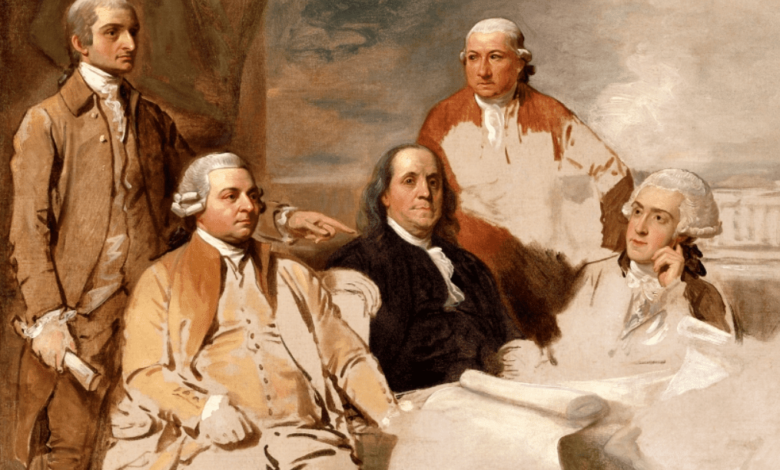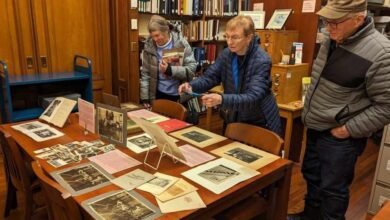John Jay’s Early Leadership in the Revolutionary Era


 Now that we are beginning to note the 250th anniversary of the Revolution, we will have a good opportunity to highlight New York’s role – and the roles of individual New Yorkers.
Now that we are beginning to note the 250th anniversary of the Revolution, we will have a good opportunity to highlight New York’s role – and the roles of individual New Yorkers.
One leader whose role is often overlooked or slighted is New York’s John Jay (1745-1829). He was an important “founding father” – member of the Continental Congress, lead writer of the New York State Constitution, first Chief Justice of the state and later of the nation, and New York’s second governor.
Jay began to emerge as a leader when he was elected to the First Continental Congress. While the delegates debated what actions should be taken to address aggressive British policies, Jay advocated a different tact: appeal not to the King or Parliament but directly to the British people.
He drafted an “Address to the People of Great Britain,” which the First Congress, after debate, adopted on October 21, 1774.
It’s still worth reading for at least five reasons. One, it shows Jay’s ability as a writer and his skill in getting colleagues to see things his way.
Two, it’s an appeal to moderation, which, if it had been heeded and followed by the British, might have headed off the Revolution.
Three, it includes several of the sentiments that would appear in the Declaration of Independence two years later.
Four, it concludes with a clear though veiled warning: Americans will resist coercive policies.
Five, the document is addressed to the British people, but it had an (unstated) secondary audience – the American people. Some wanted to maintain peace no matter what. Others wanted to get ready for war.
But many others, like Jay, were still searching for a middle way compromise that would restore American rights but not sever ties with the mother country.
Here’s a summary of the document’s main points:
*Americans and British are descended from the same ancestors.
“In almost every age, in repeated conflicts, in long and bloody wars, as well civil as foreign, against many and powerful nations, against the open assaults of enemies, and the more dangerous treachery of friends, have the inhabitants of your island [Great Britain], your great and glorious ancestors, maintained their independence and transmitted the rights of men, and the blessings of liberty to you their posterity.”
*Naturally, Americans demand the same rights as their British colleagues.
“Be not surprised therefore, that we, who are descended from the same common ancestors; that we, whose forefathers participated in all the rights, the liberties, and the constitution, you so justly boast [of], and who have carefully conveyed the same fair inheritance to us, guarantied [sic] by the plighted faith of government and the most solemn compacts with British Sovereigns, should refuse to surrender them to men, who found their claims on no principles of reason, and who prosecute them with a design, that by having our lives and property in their power, they may with the greater facility enslave you.”
*Americans have been oppressed.
“The cause of America is now the object of universal attention: it has at length become very serious. This unhappy country has not only been oppressed, but abused and misrepresented; and the duty we owe to ourselves and posterity, to your interest, and the general welfare of the British empire, leads us to address you on this very important subject.”
*No one can take British rights away from Americans.
“Know then, That we consider ourselves, and do insist, that we are and ought to be, as free as our fellow-subjects in Britain, and that no power on earth has a right to take our property from us without our consent.
“That we claim all the benefits secured to the subject by the English constitution, and particularly that inestimable one of trial by jury. That we hold it essential to English Liberty, that no man be condemned unheard, or punished for supposed offences, without having an opportunity of making his defence [sic].”
*A sea separates us but does not make Americans less deserving of their rights.
Jay repeated the same theme – Americans deserve their rights as British citizens – several times, in different ways.
“Why then are the Proprietors of the soil of America less Lords of their property than you are of yours, or why should they submit it to the disposal of your Parliament, or any other Parliament, or Council in the world, not of their election?
“Can the intervention of the sea that divides us, cause disparity in rights, or can any reason be given, why English subjects, who live three thousand miles from the royal palace, should enjoy less liberty than those who are three hundred miles distant from it?”
*Americans have loyally fought beside British in the wars with France.
“We call upon you yourselves, to witness our loyalty and attachment to the common interest of the whole empire: Did we not, in the last war, add all the strength of this vast continent to the force which repelled our common enemy?
“Did we not leave our native shores, and meet disease and death, to promote the success of British arms in foreign climates? Did you not thank us for our zeal, and even reimburse us large sums of money, which, you confessed, we had advanced beyond our proportion and far beyond our abilities? You did.”
*Since then, though, Britain has tried to “drain this country of all its money.”
In the longest section of the “Address,” Jay reviewed recent British taxation and coercion policies.
“Before we had recovered from the distresses which ever attend war, an attempt was made to drain this country of all its money, by the oppressive Stamp-Act. Paint, Glass, and other commodities, which you would not permit us to purchase of other nations, were taxed; nay, although no wine is made in any country, subject to the British state, you prohibited our procuring it of foreigners, without paying a tax, imposed by your parliament, on all we imported.
“These and many other impositions were laid upon us most unjustly and unconstitutionally, for the express purpose of raising a Revenue. — In order to silence complaint, it was, indeed, provided, that this revenue should be expended in America for its protection and defence. These exactions, however, can receive no justification from a pretended necessity of protecting and defending us.”
*Enforcement of these arbitrary acts has been coercive.
“To enforce this unconstitutional and unjust scheme of taxation, every fence that the wisdom of our British ancestors had carefully erected against arbitrary power, has been violently thrown down in America, and the inestimable right of trial by jury taken away in cases that touch both life and property.
“It was ordained, that whenever offences should be committed in the colonies against particular Acts imposing various duties and restrictions upon trade, the prosecutor might bring his action for the penalties in the Courts of Admiralty; by which means the subject lost the advantage of being tried by an honest uninfluenced jury of the vicinage, and was subjected to the sad necessity of being judged by a single man, a creature of the Crown, and according to the course of a law which exempts the prosecutor from the trouble of proving his accusation, and obliges the defendant either to evince his innocence or to suffer.
“To give this new judicatory the greater importance, and as, if with design to protect false accusers, it is further provided, that the Judge’s certificate of there having been probable causes of seizure and prosecution, shall protect the prosecutor from actions at common law for recovery of damages.”
*The destruction of tea in Boston in December 1773 was justified; the coercive acts that followed were not.
Another long section dealt with what would later be called the Boston Tea Party. Jay presented it as an issue of destruction of private property – the tea was owned by the East India Company – rather than an act of defiance of the government.
This was an example of a line of reasoning that Jay would occasionally use – arguing what was legally correct even if the argument really did not address the larger issues.
“When the design of raising a revenue from the duties imposed on the importation of tea into America had in great measure been rendered abortive by our ceasing to import that commodity, a scheme was concerted by the Ministry with the East-India Company, and an Act passed enabling and encouraging them to transport and vend it in the colonies.
“Aware of the danger of giving success to this insidious manoeuvre,[sic] and of permitting a precedent of taxation thus to be established among us, various methods were adopted to elude the stroke.”
The East India Company could have sued it court, Jay argued. Instead, “the Ministry, it seems, officiously made the case their own, and the great Council of the nation descended to intermeddle with a dispute about private property.
“Divers papers, letters, and other unauthenticated ex parte evidence were laid before them; neither the persons who destroyed the Tea, or the people of Boston, were called upon to answer the complaint.
“The Ministry, incensed by being disappointed in a favourite scheme, were determined to recur from the little arts of finesse, to open force and unmanly violence.
“The port of Boston was blocked up by a fleet, and an army placed in the town.
“Their trade was to be suspended, and thousands reduced to the necessity of gaining subsistence [sic] from charity, till they should submit to pass under the yoke, and consent to become slaves, by confessing the omnipotence of Parliament, and acquiescing in whatever disposition they might think proper to make of their lives and property.”
*Other oppressive acts since then.
Jay then listed several other grievances, including restriction of the right to trial by jury and violation of colonial charters:
“Nor are these the only capital grievances under which we labor. We might tell of dissolute, weak and wicked Governors having been set over us; of Legislatures being suspended for asserting the rights of British subjects — of needy and ignorant dependents on great men, advanced to the seats of justice and to other places of trust and importance;—of hard restrictions on commerce, and a great variety of lesser evils, the recollection of which is almost lost under the weight and pressure of greater and more poignant calamities.”
*We appeal to the virtue and public spirit of the British people.
“We believe there is yet much virtue, much justice, and much public spirit in the English nation — To that justice we now appeal. You have been told that we are seditious, impatient of government and desirous of independency. Be assured that these are not facts, but calumnies.
“Permit us to be as free as yourselves, and we shall ever esteem a union with you to be our greatest glory and our greatest happiness, we shall ever be ready to contribute all in our power to the welfare of the Empire — we shall consider your enemies as our enemies, and your interest as our own.”
*But the British people need to understand: America will resist.
Jay closed with a warning: Americans will not submit but will resist.
“But if you are determined that your Ministers shall wantonly sport with the rights of Mankind — If neither the voice of justice, the dictates of the law, the principles of the constitution, or the suggestions of humanity can restrain your hands from shedding human blood in such an impious cause, we must then tell you, that we will never submit to be hewers of wood or drawers of water for any ministry or nation in the world.”
Jay’s document and the overall impression he made at the first Continental Congress marked him as an emerging leader – moderate, reasonable, but also inspirational. It turned out to be the beginning of a long, distinguished career in public leadership.
You can read John Jay’s October 21, 1774 “Address to the People of Great Britain,” at the Founders Online National Archives website.
Illustration: A detail from “The Treaty of Paris,” by Benjamin West (1783). John Jay stands farthest to the left, the British delegation refused to pose for the painting, leaving it unfinished, a portion of this cut left out in its presentation here.
Source link




